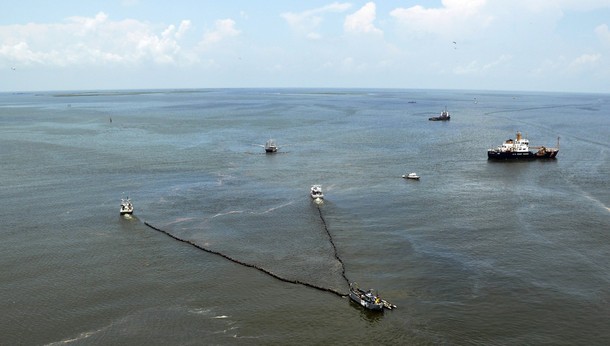
With official summer 12 days away, the temperature in Washington is already blistering. Whether this is a metaphor for an overheated political summer remains to be seen but signs and symptoms of lurking danger are in abundance.
The consequences of the Gulf of Mexico oil spill will resonate for a long time. Already, the economic impact is real and not just in the United States. BP is one of the United Kingdom’s largest companies in which many British pension funds are invested and its tax contributions considerable. No doubt al-Qaida and other groups have taken note of the vulnerability of these oil rigs and the political impact of another disaster.
Israel’s handling of the Gaza convoy was incompetent and did considerable damage to itself. One credible explanation for this heavy handedness was a signal to Iran that Israel would act in its own defense. Hence, Israeli intentions vis-a-vis its potential nuclear adversary especially with Scud missiles of Iranian provenance in the region remain worrisome.
Afghanistan and Iraq are far from settled. The remaining 15,000 U.S. troops will arrive this summer in Afghanistan as the Kandahar “process” gets under way. The bet remains how President Hamid Karzai and his government chose to and extend the reach of governance and take over Afghanistan’s security responsibilities. The forced resignations of two senior Afghan Cabinet officials this past weekend and a report critical of the state of Afghan army training aren’t good signs.
As a new Iraqi government takes shape and U.S. withdrawal of combat troops continues, Iraq isn’t of either the woods. Signs of sectarian rifts growing more violent are accumulating.
Pakistan, the crucial linchpin for the region, faces growing power, food and economic shortfalls. The insurgencies are spreading certainly in Punjab reflecting the moods of a sizable fundamentalist Islamist oriented population.
With summer heat intensifying and unless electrical power shortages are contained, public street protests are possible, whipped up by ultra-conservative elements opposed both to the ruling government and the United States. The opposition, headed by Nawaz Sharif, could exploit this convergence of crises and threaten a no confidence vote in the National Assembly.
Europe’s financial crisis is far from over as Greece, Italy, Spain and Portugal haven’t been bailed out and debts and deficits cast a dangerous specter over more than just that continent.
Nor is our economic recovery assured.
And the Korean peninsula is still consumed with the sinking of the warship Cheonan and its aftermath possibly linked with a succession crisis in North Korea.
With all of these issues bubbling or lurking, perhaps U.S. Sen. John McCain, R-Ariz., considers himself fortunate in not winning the presidency in 2008.
In the past, more halcyon days of yesteryear, administrations usually faced serial, not multiple simultaneous crises. Yes, economies fluctuated; inflation, deflation and stagnation were problematic; and times were tough. The threat of thermonuclear war lurked.
While U.S. politics tend to be remembered in kinder terms than actual events justified, the visceral hostility and polarization in today’s debate weren’t as fierce even with the evils of McCarthyism and segregation.
FDR and Churchill endured times harder than today’s. Of course, the war rallied the public in this life-and-death struggle. Great oratory and steadfastness helped. But that was decades before round the clock coverage, the Internet, video cameras in cell phones and cable news.
Any White House faces overload. Unfortunately, no one has invented an effective set of political circuit breakers when the load gets too great. And a president and his staff only have 24 hours a day to deal with this litany of real and potential crises and challenges.
What does this mean for American politics and the presidency? The most sensible safeguard is a well-informed public that understands the complexity of today’s world and the inherent difficulties of resolving tough issues. Ideology and polarization of both political parties around the more extreme left and right positions are obstacles to education and understanding. There are no signs of polarization abating.
Meanwhile, the economy has forced more families to rely on two working spouses. Earning an income is a full-time job. And during free time, how many Americans chose to learn about politics and the issues other than through the media or complaints about how government is failing us?
U.S. President Barack Obama has made speaking to Americans central to his administration and his leadership style. The downside is that familiarization can dilute impact especially as more and more crises arise and cannot be easily or immediately resolved. In contrast, FDR’s famous fireside radio addresses were a relative handful, inconceivable today.
All these factors obscure a larger crisis. Without engagement of the public, government fails its constituents. And governments aren’t well versed in engaging the public except on an issue by issue basis which then become skewed by ideology and partisanship.
The greatest contribution the Obama administration can make is to break this vicious cycle. Perhaps mitigating a long, hot dangerous summer can aid in that noble cause.
Harlan Ullman is an Atlantic Council Senior Advisor and chairman of the Killowen Group that advises leaders of government and business. This column was syndicated by UPI. Photo credit: Reuters Pictures.
Image: gulf1.jpg
